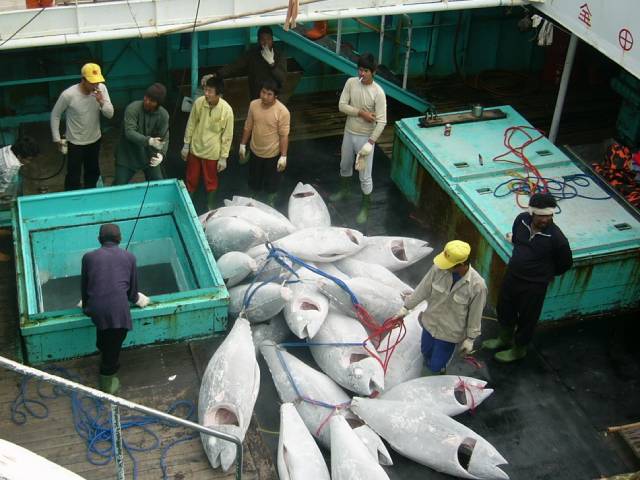Human Rights at Sea today welcomes the announcement by the Marine Stewardship Council (MSC) that new research funding will be made available to address the issue of improvements to Fisheries Observer safety following recent international initiatives and public reports on the issue.
The announcement comes after the recent publication of the Human Rights at Sea 1 July report: ‘Fisheries Observer Deaths at Sea, Human Rights and the Role and Responsibilities of Fisheries Organisations‘, which can be downloaded below.
The funds will be deployed through its Ocean Stewardship Fund in the next round which opens for applications in September 2020. This tranche of funding will also support initiatives focussed on the use of electronic monitoring and other technologies designed to support observers and deliver assurance of fishing operations.
The issue is topical with the ongoing investigation into the alleged murder of Kiribati Fisheries Observer, Eritara Aati Kaierua on board the Taiwanese flagged Win Far 636 fishing vessel in March 2020 as reported by Human Rights at Sea on 8 June 2020.
CEO, Rupert Howes, stated in the announcement: “The MSC’s mission is to end the global crisis in overfishing. This is an enormous and complex challenge, supported by the extraordinary hard work and efforts of many people – including observers.
Governments, law enforcement agencies and regulatory authorities must do more to ensure observer safety. But we recognise – as part of the wider sustainable seafood community – that the MSC also has a part to play. We want to do so in a way which is practical, by helping those who are already working in this field, pilot and test promising initiatives.
By working collaboratively with others, we believe we can help protect the human rights of observers and support them to carry out their vital work safeguarding our oceans.”
CEO, David Hammond, commented: “We are pleased to see the rapid and positive public response by the MSC in taking the issue of the safety, security and well-being of Fisheries Observers seriously. Human Rights at Sea has already started the follow-on work to develop the 1 July report’s 10 recommendations and which we trust will include close engagement of the MSC, with this research initiative being just the start.”
—–
 The HRAS Report’s 10 Recommendations
The HRAS Report’s 10 Recommendations
The Report highlights 10 key recommendations which, if addressed, could pave the way for significant positive changes for the safety of workers at sea. They are:
- Recommends transparent and unimpeded investigations into all cases of human rights violations against Fisheries Observers and crew, including the full and unredacted public disclosure of the facts, findings and outcome by the State authorities involved, for public scrutiny by those related international fisheries certification organisations, Observer associations and civil-society entities with a vested interest.
- Recommends regular engagement of Interpol, alongside flag, port and coastal State authorities, for all violations of individual fundamental human rights of Fisheries Observers and crew, including, but not limited to, murder (homicide), violence towards the person resulting in bodily harm, sexual assaults, slavery, trafficking and deaths at sea.
- Recommends that any Observer death, disappearance, illness or injury must be immediately reported to the Observer programmes, and subsequently there should be forfeiture of confidentiality with full disclosure of any VMS data associated with any voyage where an Observer disappears or dies at sea.
- Recommends that there must be a mandated provision of personal communication devicesindependent of any vessel communications electronic systems for all Observers working at sea, globally.
- Recommends that international fisheries certification organisations should mandate all registered vessels, as part of the contractual terms and conditions for use of their schemes, to promote, and where able, to assure continuous operation of AIS on all certified vessels to allow public cross-referencing with VMS data at all times, independent access, review and monitoring of vessel and fleet VMS data; two Observers per vessel, or one Observer plus on-board tamper-proof equipment supporting electronic monitoring.
- Recommends that international fisheries certification organisations should maintain centralised, consistent, up-to-date, and publicly available lists of all certified vessels, and where applicable include available registration details, as well as those suspended and/or excluded, with regular proactive public disclosure of the reasoning for suspension and/or exclusion.
- Recommends that international fisheries certification organisations should immediately freeze the certificates of all vessels involved in allegations of human rights abuse until investigations are concluded. This would allow buyers to avoid problematic vessels, protect the remainder of the supply chain, and provide reassurance that due process is being carried out by competent authorities.
- Recommends that all fisheries management organisations, fisheries certification organisations and bodies, and fisheries management platforms should have, as a bare minimum, public-facing policies that reflect published business strategies to include fundamental human rights protections and necessary safeguards for all workers in their area of influence, reflecting international legislative and voluntary human rights and labour rights norms.
- Recommends that all fisheries management organisations should introduce internal collation and reporting mechanisms for the recording of incidents of human rights and labour rights abuses, for subsequent investigation by the competent authorities. This should include published pathways for internal reporting, investigation, external independent review, and routes to remediation and effective remedy.
- Recommends that in the circumstances of a death at sea, employers must act expeditiously to compensate families for their loss, while ensuring that, at all times, effective insurance policies are in place.

Download our latest independent report on the issues faced by Fisheries Observers, their safety, well-being and personal security when operating alone at sea dated 1 July 2020.









































